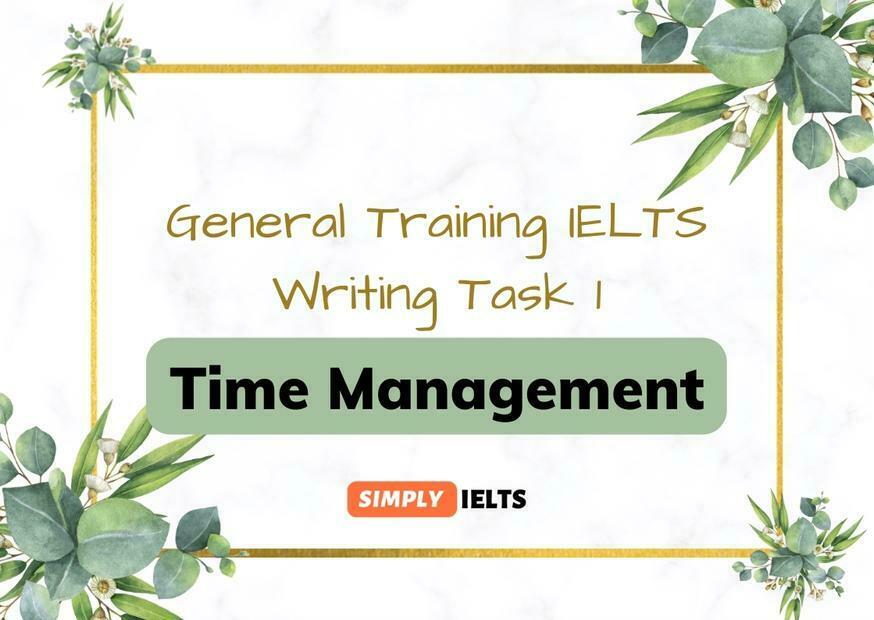How to manage time on IELTS Letters on General Training module?
How to manage time on IELTS Letters on General Training module?

Most students find managing time on IELTS letters difficult. When I explain the problem lies with the approach and not with the letter writing skills, they find it difficult to digest.
In this article, I have tried to address the essential question “how to manage time on IELTS letter?” After reading this blog, you will know how to approach the letter in the real exam scenario. And, you will learn about time management for IELTS examination.
To manage time well on IELTS Letters or Writing Task 1 (General Training), you must divide given 20 minutes in three stages: Thinking, Writing and Editing.
You must ensure that you never mix these three functions; otherwise, you may waste ample time. You must think for about 4 minutes, write the IELTS Letter for about 13 minutes and edit it in about 3 minutes.
Why do most students fail in IELTS letter writing?
Before we move ahead, visualise this situation when just joined your first job. This has happened with almost all of us. In the afternoon, you had to write a critical mail; even the director of the company is marked in CC.
Now since the email is vital for your department or company, you try to ensure that you write it well. You spend more than four hours just to write about ten sentences, and you feel this is the best piece of writing you have ever done. You are delighted with your efforts, and so you send the mail and go home.
The next morning, you return to the office with a lot of enthusiasm. You open the outbox, and you read your sent mail. And then you want to kill yourself.
I know that’s extreme, but you start noticing mistakes in the same mail that you thought was perfect on the previous evening. What happened? What changed overnight?
Overthinking and lack of planning kills IELTS Writing section
Nothing changed. What happened was that when you set yourself to write that email, you thought about how to be impressive while using words and grammatical structures more than the message you wanted to deliver. So, you did not plan well.
You wrote the first two sentences, and then you realised, oh this is not what I wanted to write. So, you changed the whole sentence completely. Then you could complete only four sentences when you had a brilliant idea for which you had to change the order of points already written.
Unfortunately, many of us go back and forth when we have to write anything.
Now, as shown, this cycle of thinking, writing and editing continues. Your brain, tired of these repetitions, shuts itself off and cannot see all the mistakes that you have committed. Hence, all those errors remain as it is. Not planning your letter or email costs you dearly.
Now if you have appeared for IELTS before or even have practised letter writing before, most of you had difficulty in completing the letter just because of lack of planning.
Better time-management
You may have noticed that there three main tasks: thinking, writing and editing. To overcome the problems associated with your current approach, you must divide these three jobs separately. The accompanying image summarises the new approach crisply.
Stage 1: Thinking
You should think for about 4 minutes, in the first stage. Here, you should note down the points you are going to write about.
Where to take notes?
The simple answer is on the question paper in case of IELTS paper-based. On the question paper after the question itself, ample space is available for you to take notes. Don’t bother about rubbing your points off after the task is complete. The IELTS examiner is going to judge your writing skills only on the answer sheet.
On the other hands, in case of the computer-delivered test, you are provided with a pencil and paper to take notes.
Yet, I recommend you can note down the main points on the computer screen itself. What I mean since cut and paste functions are available on the computer-delivered test, you can always type in your thoughts and then convert them into sentences while writing.
For example, let’s assume you are explaining why you could not write a letter to your friend. Now, instead of taking notes on the paper, you can simply note
Could not reply
Office work
New project
Now you can use the same ideas to complete the reason later.
Stage 2: Writing
In the second stage, convert your points into sentences. In this stage, convert the points that you have already thought about into sentences. Don’t stop in between. Understand the moment you stop, new thoughts creep into your mind, and the moment you get new ideas, you deviate from the task at your hand.
To ensure success on this stage, you should write the actual letter in about 13 minutes. Many people freeze over here. How can I write the whole letter in 13 minutes? They ask.
Now can I expect you to write about 13 words in a minute? Yes, it is reasonable to assume that one person can write 13 words in one minute, right? Then with the same speed can expect you to write about 170 words in about 13 minutes.
Yes, it is possible. However, to be sure that you can actually write these 170 words in 13 minutes, you need a plan which you will create in the first 4 minutes.
In the previous stage, you thought about the reason why you could not respond to your friend. You can make the following sentence using the same words.
My apologies for not replying after I received your post. As you know, currently office work is hectic due to the new project. So, I could not find enough time to write this letter.
You see, noting the points and then forming the sentences using the same words us convenient on the computer-delivered test.
Stage 3: Editing
In the last 3 minutes, you should edit the letter that you have written. While editing your letter, check the sentences for clarity of ideas. Your sentences must express the intended meaning only and nothing else. Then you must ensure the flow of ideas.
Lastly, check for precision in using words and grammar. If you feel that you have committed any error, you can edit these things in the last 3 minutes.
Now while editing if you feel that you must replace a particular word, you may do so. In the point that we wrote you might feel the word apologies is too formal, you may replace it.
I am sorry for not replying after I received your post. As you know, currently office work is hectic due to the new project. So, I could not find enough time to write this letter.
Summary
To manage time well on the IELTS Letter writing task, you must divide the allotted 20 minutes into three distinct stages: thinking, writing and editing.
You must not mix the tasks in these three stages. In case you mix them, you will face trouble.



Responses